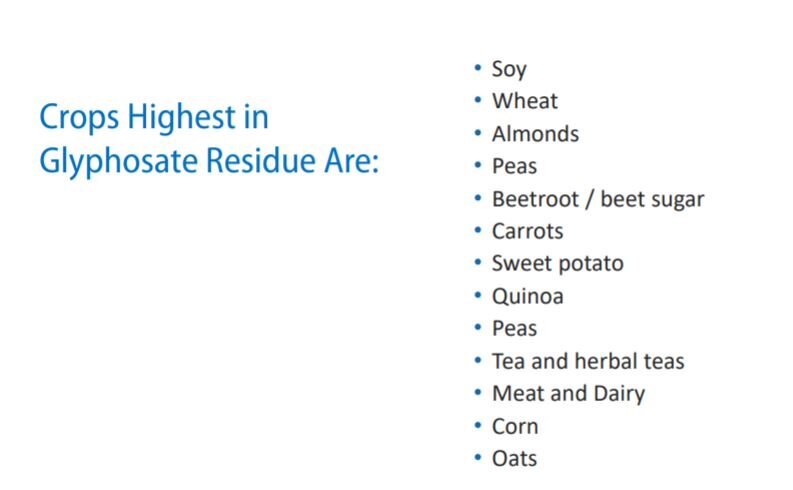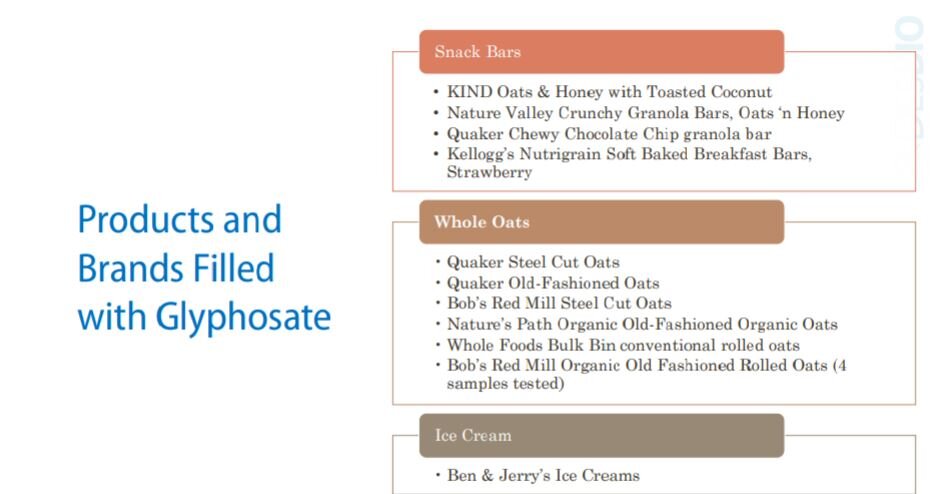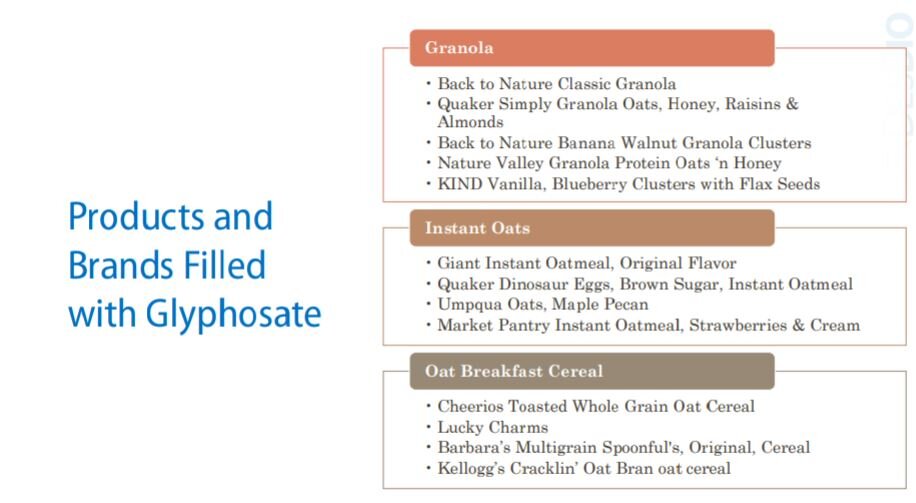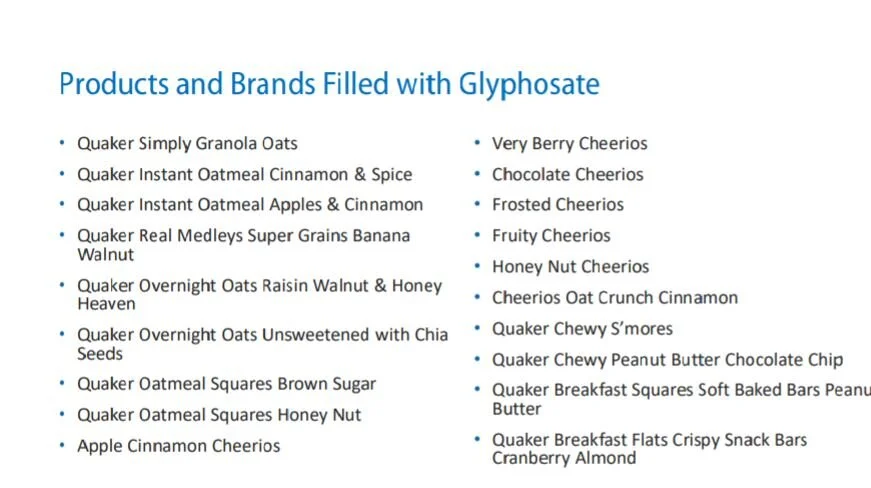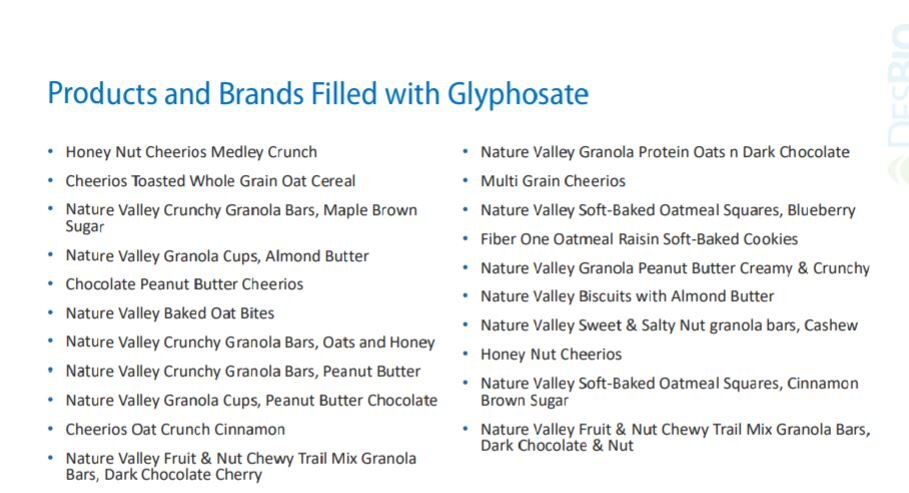10 things you should know about Glyphosate
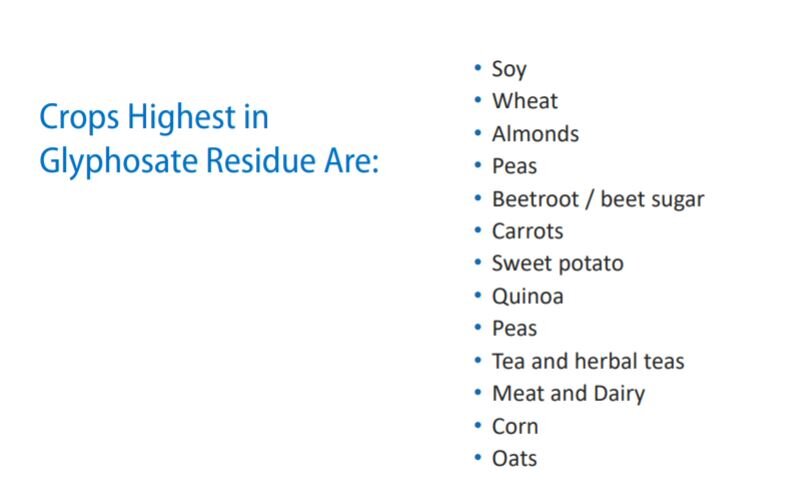
Blog credit source: Dr Todd Watts & Dr Jay Davidson
1. May Rob You of Minerals
Glyphosate was known to bind minerals long before its weed-killing effects were discovered. The chemical can bind calcium, magnesium, iron, manganese, and other minerals in the soil. That could deprive crops of these nutrients. (1, 2, 3)
The weed killer can also drift from where it’s sprayed. That could reduce the nutrients in crops in nearby fields, too. (3, 4)
This could mean fewer nutrients for animals that eat the crops. It could also limit your mineral intake if you eat the crops or the meat of those animals.
Manganese is a top concern. Glyphosate’s ability to act as an herbicide is intertwined with its ability to bind manganese. That could have many unintended consequences. (5)
For example, when cows ate soy, corn, and other crops treated with glyphosate, they became severely deficient in manganese and cobalt. And their urine showed high levels of glyphosate. (6)
Another study found that 63% of calves with birth defects — including malformed bones and cartilage — were deficient in manganese. And all stillborn (non-surviving) calves had extreme manganese deficiency. (5, 7)
Manganese is also vital to your health. It helps make and activate enzymes. This helps: (5, 8, 9, 10)
Support your immune system
Create antioxidants and fight free radicals
Maintain healthy mitochondria
Utilize nutrients and produce energy
Promote healthy blood sugar
Form bones and cartilage properly
Support good brain function and mental health
Promote healthy reproduction
Do you have problems with any areas in the above list? Many people do. And glyphosate may be a root cause. (5)
2. Could Damage Your Liver
If you were trying to kill a weed, you’d want to make sure it couldn’t block your efforts by detoxing the poison. Glyphosate fits the bill in this regard. It may hinder liver detox — not only in plants but also in animals and potentially in people.
How might the chemical interfere with detoxification?
You produce enzymes called cytochrome P450. One of their main functions is to help detoxify harmful substances in your liver. But glyphosate may inhibit your ability to make these detox enzymes. (11)
Consider a study in which rats ingested a glyphosate-based herbicide for three months. The cytochrome P450 enzymes in their liver cells dropped by about 50%, compared to the control group. It’s tough to detox well when you’re lacking half the enzymes you need. (12)
As glyphosate toxicity builds, that could lead to liver damage.
In another study, rats were exposed to a glyphosate herbicide for two weeks. They developed significant liver inflammation, especially at higher doses of the weed killer. Plus, they developed scarring and unwanted fat deposits in their liver. Other animal research has found liver-damaging effects from very low doses of glyphosate. (13, 14)
In people, non-alcoholic fatty liver disease is the most common chronic liver condition worldwide. It’s caused by fat deposits in your liver. The condition can lead to liver cancer or the need for a liver transplant. (15)
Could glyphosate be one of the culprits in this widespread liver problem?
One study found that people with advanced fatty liver disease were excreting more glyphosate compared to people with less liver damage. This suggests there’s a link between glyphosate toxicity and non-alcoholic fatty liver disease. (16)
3. May Lead to Gut Issues
A motto at Microbe Formulas is, “A healthy microbiome is a healthy you.” With glyphosate in the picture, your gut microbiome may not be very healthy.
Glyphosate interrupts the shikimate pathway in weeds and other plants. This pathway is how they produce certain amino acids. Without the amino acids, the plants die. You don’t have a shikimate pathway. But some of the microbes in your gut do. (5, 17)
Glyphosate can kill off beneficial microbes by disrupting the shikimate pathway. And it’s been shown to disrupt the microbiota of soil, plants, and animals. In fact, the chemical could act as an antibiotic. The herbicide may kill off your good bacteria, such as Lactobacillus. (5, 18, 19)
Manganese deficiency comes into play here. Lactobacillus uses manganese to protect itself from free radical damage. If glyphosate lowers manganese, good gut microbes could be damaged and die. That disrupts the balance of your gut bacteria and leads to inflammation. This upset is called dysbiosis. (5)
In gut dysbiosis, harmful bacteria like Salmonella overgrow. And that may increase your risk of inflammatory bowel disease, including ulcerative colitis and Crohn’s disease. Gut dysbiosis and inflammation could also increase your risk of leaky gut. (5, 20)
Glyphosate may be a factor in celiac disease, too. That’s an autoimmune condition that flares when you eat gluten, a protein in wheat. Glyphosate may hinder the growth of gut microbes that support gluten breakdown. This may also be a reason people develop non-celiac gluten sensitivity. (21)
4. Could Damage Your Kidneys
Your kidneys are another vital detox organ that could be affected by glyphosate toxicity. Remember, your kidneys filter waste products and other toxins from your blood, which you eliminate via urine.
Farmers in Sri Lanka, Mexico, and Central America have a rapidly growing rate of unexplained chronic kidney disease. In other words, it’s not due to typical factors like diabetes or high blood pressure. But it may be closely linked to their exposure to glyphosate. (22)
There are several possible reasons for the link between unexplained chronic kidney disease and glyphosate use in Sri Lanka. These include: (22, 23, 24)
Increase in heavy metal toxicity: Glyphosate-based herbicides commonly contain toxic heavy metals. The weed killer may usher toxic heavy metals like arsenic past your gut barrier and eventually to your kidneys. Your urine is acidic, which could break the bond between glyphosate and heavy metals. That enables them to damage your kidneys.
Overgrowth of environmental pathogens: Cyanobacteria (blue-green algae) overgrow in glyphosate-contaminated waterways in Sri Lanka. The algae release toxins that you can inhale, absorb, or ingest in water. These toxins can damage your kidneys.
Reduction in antioxidants: Lab research suggests glyphosate herbicides may deplete your glutathione. That’s an antioxidant your body generates. You need glutathione to help shield your kidneys from toxins.
Decrease in vitamin D activity: Remember that glyphosate lowers your P450 enzymes? These do more than liver detox. They activate vitamin D in your kidneys. Vitamin D helps to combat kidney inflammation. Low vitamin D is common in chronic kidney disease.
5. Could Increase Your Risk of Cancer
The International Agency for Research on Cancer classifies glyphosate as “probably carcinogenic to humans.” That should set off alarm bells for everyone. (20, 25)
Another alarming finding is the link between glyphosate and cancer in recent court cases. The most prominent cases have involved non-Hodgkin’s lymphoma — and for good reason.
A review of observational studies found that glyphosate exposure increased the risk of non-Hodgkin’s lymphoma by up to 41%. Risk is greater with higher and longer-term exposures. (26)
Lab and animal studies suggest glyphosate is also linked with several other cancers, including cancers of the: (5, 27, 28)
Breast
Intestines
Kidneys
Pancreas
Skin
Stomach
Thyroid gland
One reason for the increased cancer risk may be the herbicide’s impact on your DNA. Tests in animals and on human cells suggest that glyphosate-based herbicides may increase breakage and mutations in your DNA. (5, 20, 29)
In a lab study on human mouth cells, a glyphosate-based herbicide caused DNA damage in less than 20 minutes. The concentrations used were much lower than those typically used in farming. Such exposure could happen when you inhale while spraying the chemicals. (30)
Still, doesn’t your body have ways to repair your DNA?
Yes, but animal and lab studies suggest glyphosate herbicides may prevent cells from fixing DNA damage. (31, 32)
6. May Contribute to Brain and Nervous System Issues
You already know glyphosate could disrupt your gut microbiota, potentially leading to intestinal issues. But the microbes in your gut are connected to your brain via the microbiota-gut-brain axis. So, altering your microbiota may also affect your mental health and brain function.
For example, anxiety disorders have been rising. This may be related to the increased use of glyphosate. Anxiety disorders have increased at a similar rate to glyphosate use in recent decades. (5)
As already mentioned, the concentration of Lactobacillus in your gut could be lowered by glyphosate. Some species of the bacteria produce a neurotransmitter called GABA or gamma-aminobutyric acid. It helps to calm your nervous system. (5)
Without enough GABA, your anxiety levels could increase. Anxiety is often an issue in autism, Parkinson’s disease, and Alzheimer’s disease. Those disorders have also been on the rise — in parallel with increased glyphosate use. (33, 34, 35, 36)
The link between glyphosate and brain disorders is supported by research and case studies.
For example, when worms were exposed to glyphosate, they developed Parkinson’s disease. This was due to damage in brain cells that use GABA and dopamine. And a man developed Parkinson’s disease one month after accidentally spraying glyphosate on his skin. (5)
Experts think that glyphosate substitutes itself for proteins in your body. When your immune system detects something is wrong with the proteins, it “attacks” them. Unfortunately, it may not be able to distinguish between “good” or “bad” proteins. (37)
This might remind you of brain disorders like multiple sclerosis (MS). In this autoimmune condition, your immune system attacks “good” proteins in the myelin sheath that protects your nerves.
Not surprisingly, MS has also been linked with rising rates of glyphosate exposure. For example, sugar beets are highly sprayed with glyphosate. Areas in the world where sugar beets are grown have the highest rates of MS in the world. (37)
7. Could Disrupt Mitochondrial Function
Your mitochondria are vital to your health and survival. They’re essential for producing energy, and they also help fight viral infections. But glyphosate may interfere with these functions. (38)
Mitochondria generate energy in an assembly-line fashion. Each part of the system has to do its part. Otherwise energy production will drop. Glyphosate-based herbicides may inhibit part of the energy-making process. That means less ATP or energy for you. (36)
Glyphosate herbicides may also increase the production of damaging free radicals in your mitochondria. That could be partly due to glyphosate’s interference with manganese. This mineral helps form a key antioxidant that protects mitochondria. (8, 36, 39)
With less antioxidant protection, your mitochondria are more vulnerable to injury. And that can lead to increased risk of disease, including cancer. (39)
Lab studies have shown that glyphosate-based herbicides can damage mitochondrial DNA in human lung and liver cells. The herbicide causes the collapse of mitochondrial membranes. And this signals the cells to self-destruct. (40, 41)
The toxic effects on mitochondria are especially alarming when the doses are considered. Damage has been found at herbicide concentrations lower than typical exposures of workers. (40)
8. May Affect Your Heart and Arteries
Your heart beats rhythmically without you giving it any thought. Each pump is triggered by an electrical impulse. But glyphosate may interfere with that. (42)
Animal tests suggest that a high dose of a glyphosate herbicide — which you could encounter in a poisoning accident — could cause electrical abnormalities. This results in arrhythmia, meaning your heart beats erratically. That can be life-threatening. (43)
There’s evidence of the link between arrhythmia and glyphosate in people, too.
In a case study, a woman used a high-dose glyphosate herbicide for yard work for several weeks. She sometimes spilled the weed killer on her hands. One day after such a spill, she fainted. Emergency room tests showed heart rhythm problems, which she had no history of. (44)
Heart risks to farmers are especially concerning, as they often spray very high concentrations of glyphosate herbicides. Electrocardiograms — which measure the electrical activity of the heart — have detected erratic heartbeats in farmers exposed to high amounts of the weed killer. (43)
But that’s not the only way glyphosate-based herbicides may harm your heart.
Remember, when glyphosate causes mitochondrial dysfunction, it leads to less antioxidant protection and more free radicals. This could contribute to oxidative damage to LDL (bad) cholesterol. That can build up in your arteries, causing atherosclerosis or artery stiffening. (8)
9. Could Alter Fertility and Healthy Development
Growing evidence suggests glyphosate-based herbicides could reduce fertility and alter the healthy development of babies.
About 12% of couples in the United States have trouble becoming pregnant. Studies suggest glyphosate herbicides may be part of the problem. The chemical may reduce the ability of sperm to “swim” upstream to fertilize an egg and begin a pregnancy. (45, 46)
In one study, semen from healthy men was exposed to a glyphosate herbicide. After one hour, the motility or “swimming ability” of sperm dropped by 11%. And the sperm had an increase in dysfunctional mitochondria, which can decrease motility. (46)
A similar study tested the effect of glyphosate alone, rather than glyphosate within an herbicide formulation. It also found that sperm motility dropped by 11% after one hour of exposure to glyphosate. This suggests it’s the glyphosate causing the effect. (46)
Glyphosate herbicides may also disrupt your hormones. These vital messengers tell your body’s cells what and when to do something — like traffic signals. But glyphosate herbicides can create “traffic glitches” in hormone signaling. That could disrupt the healthy development of babies. (47)
When tadpoles were exposed to glyphosate-based herbicides in amounts typical in the environment, their nose, tail, and reproductive organs were abnormal. This may be due in part to chemicals disrupting thyroid hormone signals, which you need for healthy development. (48)
Similarly, when pregnant rats were exposed to glyphosate herbicides, their offspring had a slow-working thyroid gland. The weed killer reduced levels of thyroid stimulating hormone (TSH). You need TSH to trigger your thyroid gland to make and secrete thyroid hormones. (49)
10. May Cause Prion Diseases
Emerging evidence suggests glyphosate may increase the risk of prion diseases. You may be more familiar with these than you might think. Prions cause mad cow disease. That’s a fatal brain disorder that can affect cattle. (50)
But prion diseases don’t only affect cattle. They can also affect you, though this is relatively rare.
One prion disorder in people is Creutzfeldt-Jakob disease (CJD). This brain disease is marked by symptoms similar to dementia, as well as difficulty walking and talking. Like mad cow disease, CJD can also be fatal. (51, 52)
So, what exactly are prions? They are misfolded proteins. Prions are “infectious” and can cause your cellular proteins to misfold. Still, prions aren’t alive. They are zombie-like proteins that duplicate themselves. (53)
Scientists have some insights into how glyphosate may play a role in prion diseases.
Animal research shows that prions bind copper in the body. Ironically, this helps prevent prions from causing disease. But glyphosate is especially good at binding copper. So, the herbicide could “tie up” copper, leaving you without protection from prion disease. (5)
The only other mineral that binds with prions is manganese. But glyphosate oxidizes manganese, making it toxic. When prions bind the toxic manganese, it may trigger more proteins to misfold in your brain. The mineral may also cause prions to clump. This is toxic to your brain. (5)
A newer idea is that glyphosate may be mistaken for glycine. That’s an amino acid that is similar in structure to the herbicide. If glyphosate is used in a protein instead of glycine, that could result in misfolding and potentially prion disease. (5, 54)
Though this theory hasn’t been proven, related research suggests it’s plausible. Many plants and microbes have developed resistance to glyphosate by altering their genetic code, so they don’t need glycine in critical areas. They’ve figured out how to beat glyphosate at its own game. (54)
Are you ready to beat glyphosate at its game, too? This starts by knowing where you’re getting exposed.
What Foods Have Glyphosate in Them?
You may be wondering what foods are grown with glyphosate so you can avoid them — especially if you can’t afford organic foods.
As you might guess, glyphosate is commonly used on genetically modified (GMO) crops like soybeans and corn. They’ve been altered to withstand the chemical. But it’s also sometimes used on crops like wheat and barley to dry them out so they can be harvested sooner. (55)
Glyphosate herbicides are commonly used to produce: (55, 56)
Soybeans
Corn
Cotton (such as for cottonseed oil)
Wheat
Alfalfa (for livestock feed)
Sorghum
Barley
Sugar beets
Canola oil
Citrus fruits
Sometimes glyphosate is also used to grow other vegetables, fruits, and nuts. For example, it’s sometimes used on almonds, grapes, and beans. And glyphosate has been found in the meat of cattle. So, don’t assume your food is glyphosate-free unless you know how it’s produced. (56, 57)
Glyphosate isn’t limited to your food either. It’s also in your water. The herbicide spreads with runoff from rain. The chemical has been found in groundwater — such as for public water and farming — and bottled water. (58)
Can You Detox Glyphosate?
You may wonder how to find out how much glyphosate is in your food or body. How to detox it is another common question.
You can get at-home testing kits for glyphosate via The Detox Project and Health Research Institute Laboratories. They can test for glyphosate in food, water, and human (hair or urine) samples.
Or, you can just assume you have glyphosate in your body and your food — especially if you eat conventionally-grown crops. Since glyphosate is the most widely-used herbicide in the world, it’s most likely contaminating your body.
So, how do you detox it?
Bind glyphosate and replace minerals
Nature has provided some impressive compounds to help remove glyphosate. These are BioActive Carbons, which consist of select extracts of humic and fulvic acid. These bind toxins like glyphosate and pull them out of your body.
A lab test showed that humic acid can tightly bind to glyphosate, breaking the herbicide’s bonds with other molecules. (59)
Another study found that feeding chickens humic acid significantly helped reduce the amount of glyphosate in the birds’ tissues. That included lowering glyphosate in their blood, liver, gut, heart, muscles, spleen, and lungs. (5, 60)
You also need to combat the mineral-binding action of glyphosate. BioActive Carbons not only help remove glyphosate, but they can also provide nutrients to your tissues. The carbons contain a broad spectrum of naturally-occurring minerals.
Change your diet and lifestyle
One of the top ways to reduce your exposure to glyphosate is by choosing organic foods instead of those grown conventionally. Organic foods aren’t allowed to be grown with man-made herbicides like glyphosate.
Consider a study in which scientists tested the urine of people eating a mostly organic diet versus a conventional diet. The organic diet group had around 72% less glyphosate in their urine. That suggests their body was significantly less polluted with glyphosate. (61)
Another way to potentially combat glyphosate is to consume fermented foods like sauerkraut and apple cider vinegar containing live cultures (probiotics). Lab studies suggest that certain bacteria could help break down glyphosate. (62)
Also, consider drinking distilled water or reverse osmosis water to help reduce your glyphosate exposure. (Check with your water filtration company to find out what’s removed.) You can add a drop of BioActive Carbon-based minerals per one glass of water for nutritional support.
Lastly, avoid every use of glyphosate-based herbicides in your yard. Don’t let landscaping companies sway you to believe you need toxic chemicals to have a beautiful lawn.
Proactive Path Against Glyphosate
Awareness of the health risks of glyphosate-based herbicides continues to grow, especially with the prominence of recent court cases. And research is increasingly backing what some scientists have known for decades.
Glyphosate-based herbicides are a likely culprit behind cancer, gut issues, and infertility. And they could damage your organs — including your liver, kidneys, brain, and heart. Glyphosate could also rob you of vital minerals and derail your mitochondria.
All things considered, the evidence stacked against this toxic weed killer is pretty undeniable.
Unfortunately, glyphosate is still prevalent in your food, water, and the environment. But that doesn’t mean you are powerless against it.
Choose organic foods to help reduce your exposure to the herbicide. And consider BioActive Carbon to support your body’s natural detoxification process.
What steps will you take to tackle glyphosate toxicity?
